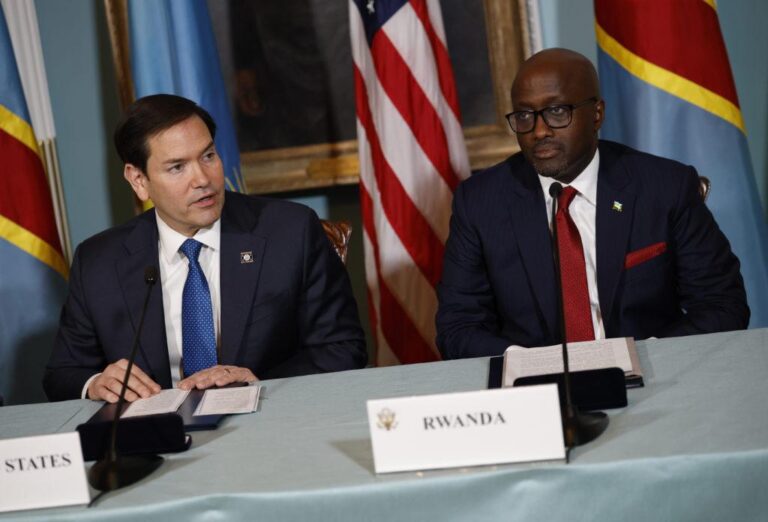U.S. and Rwanda Engage in Talks on Deportation Partnership
The Department of Homeland Security under the Trump administration has initiated formal discussions with Rwandan authorities to explore a deportation agreement. This initiative aims to facilitate the repatriation of certain undocumented individuals residing in the United States by expanding the roster of countries cooperating in U.S. immigration enforcement. Rwanda’s openness to receiving deportees represents a strategic pivot to diversify deportation destinations beyond the usual nations involved in such arrangements.
Core Elements of the Proposed Agreement:
- Development of standardized procedures for identifying and transferring deportees
- Commitment from Rwanda to accelerate processing and guarantee secure reception of returnees
- Implementation of a pilot phase to assess operational and diplomatic viability
| Component | U.S. Responsibilities | Rwanda’s Commitments |
|---|---|---|
| Verification Process | Screen and identify eligible deportees | Confirm nationality and legal status |
| Logistics | Arrange transportation and flights | Ensure safe and orderly arrival |
| Legal Framework | Negotiate and draft bilateral treaty | Align with domestic legal standards |
Assessing Rwanda’s Suitability as a Deportee Destination
The prospect of Rwanda serving as a receiving country for U.S. deportees has sparked intense discussion among policymakers, human rights advocates, and international observers. Concerns center on Rwanda’s capacity to uphold the rights and welfare of returnees, the transparency of deportation processes, and the adequacy of local infrastructure to support reintegration. Conversely, proponents argue that this collaboration could relieve pressure on the U.S. immigration system, which is currently managing unprecedented numbers of undocumented migrants, and foster innovative bilateral cooperation models.
Primary Issues Driving the Debate:
- Human Rights Safeguards: Scrutiny over Rwanda’s historical treatment of deportees and the availability of reintegration programs.
- Legal and Ethical Considerations: Ensuring deportations comply with international norms and due process requirements.
- Diplomatic Consequences: Potential effects on U.S.-Africa relations and regional geopolitical dynamics.
- Socioeconomic Effects: Impact on Rwanda’s communities, including labor market and social services.
| Dimension | Possible Outcomes |
|---|---|
| Human Rights | Heightened need for oversight and accountability |
| Security | Strengthened vetting and monitoring protocols |
| Economic | Potential strain or growth in local employment sectors |
| Diplomatic | Enhanced cooperation and strategic partnerships |
How the U.S.-Rwanda Deportation Pact Could Influence Immigration Policy
This emerging agreement signals a transformative approach in U.S. immigration enforcement, potentially setting a new standard for outsourcing deportations to third-party nations. Such a framework could redefine the management of undocumented populations, especially for individuals from countries with complex diplomatic relations or limited repatriation options. However, this strategy raises critical questions about national sovereignty, human rights adherence, and the durability of international partnerships.
From a policy standpoint, the deal may:
- Broaden diplomatic engagement by incorporating non-traditional partners into immigration enforcement efforts.
- Alleviate logistical burdens and reduce costs associated with deportations to countries unwilling or unable to accept returnees.
- Influence global migration patterns as other nations might adopt similar agreements, potentially affecting asylum processes and refugee movements worldwide.
| Policy Element | Expected Effect |
|---|---|
| Deportation Operations | More efficient through third-country facilitation |
| International Diplomacy | New alliances and negotiation dynamics |
| Human Rights Monitoring | Greater emphasis on oversight and compliance |
Ensuring Protection of Human Rights in Deportation Agreements
Protecting the fundamental rights and dignity of deportees is essential throughout the repatriation process. Governments must implement robust legal safeguards that guarantee access to legal representation, clear communication regarding deportation grounds, and opportunities for appeal. Such measures uphold justice and align with international human rights standards. Additionally, comprehensive assessments of the receiving country’s safety and treatment conditions are critical to prevent deportations to environments where individuals may face persecution or mistreatment.
Recommended practices to uphold human rights include:
- Independent oversight: Establishing autonomous bodies to monitor deportation procedures and ensure adherence to human rights norms.
- Transparency measures: Regular publication of deportation data and conditions to foster accountability.
- Post-arrival support: Providing healthcare, mental health services, and reintegration programs to assist deportees in rebuilding their lives.
| Recommendation | Objective | Expected Result |
|---|---|---|
| Independent Audits | Verify compliance with human rights | Minimized rights violations |
| Access to Legal Counsel | Safeguard deportee legal protections | Equitable treatment |
| Reintegration Assistance | Support successful returnee adjustment | Reduced likelihood of re-migration |
Conclusion: Navigating the Complexities of U.S.-Rwanda Deportation Talks
As the Trump administration and Rwandan government continue to negotiate the terms of a deportation agreement, the evolving discussions highlight the multifaceted challenges inherent in immigration policy and international collaboration. Stakeholders will be watching closely to see how this potential pact influences diplomatic relations, domestic immigration enforcement strategies, and the experiences of individuals subject to deportation. Ongoing updates are anticipated as both nations work to balance legal, humanitarian, and political considerations in this unprecedented arrangement.







